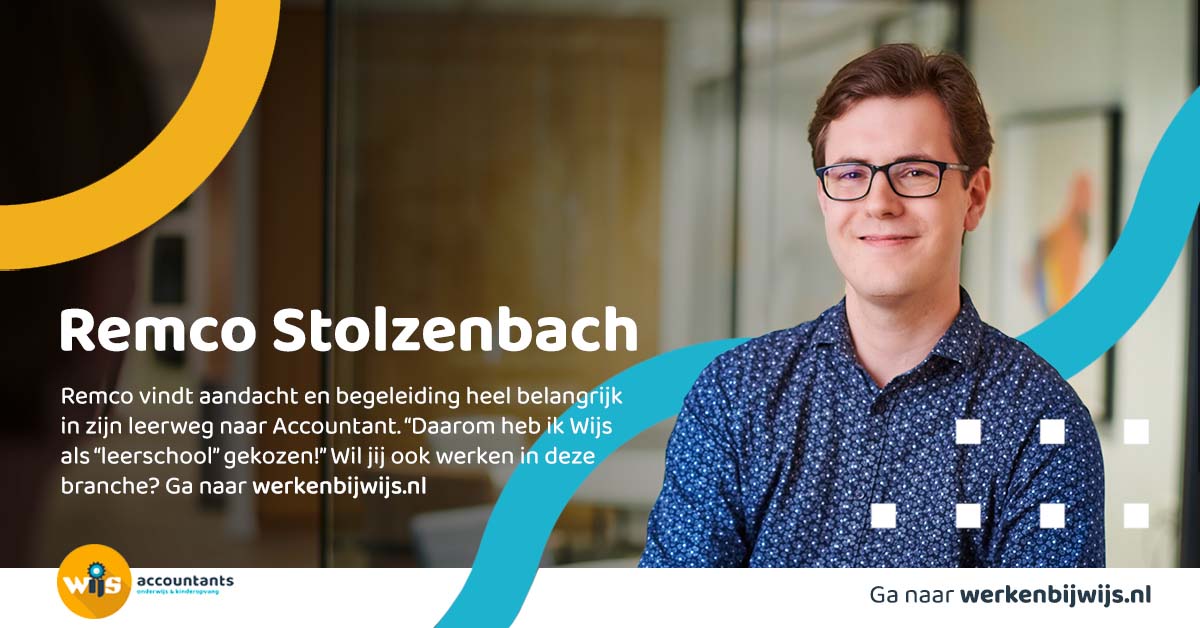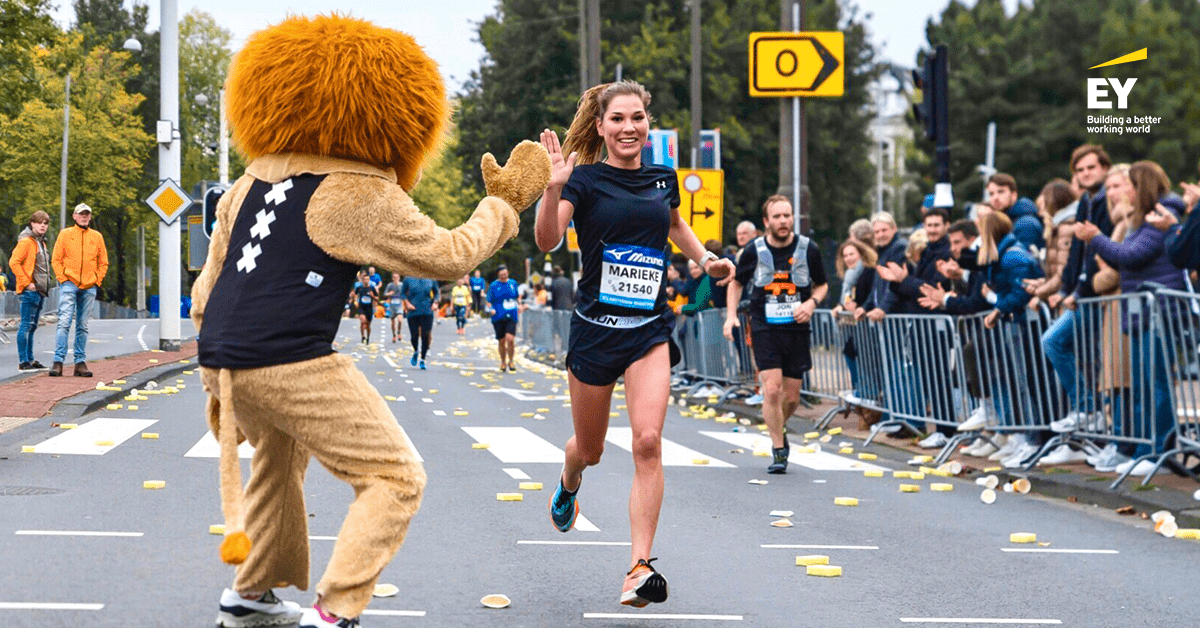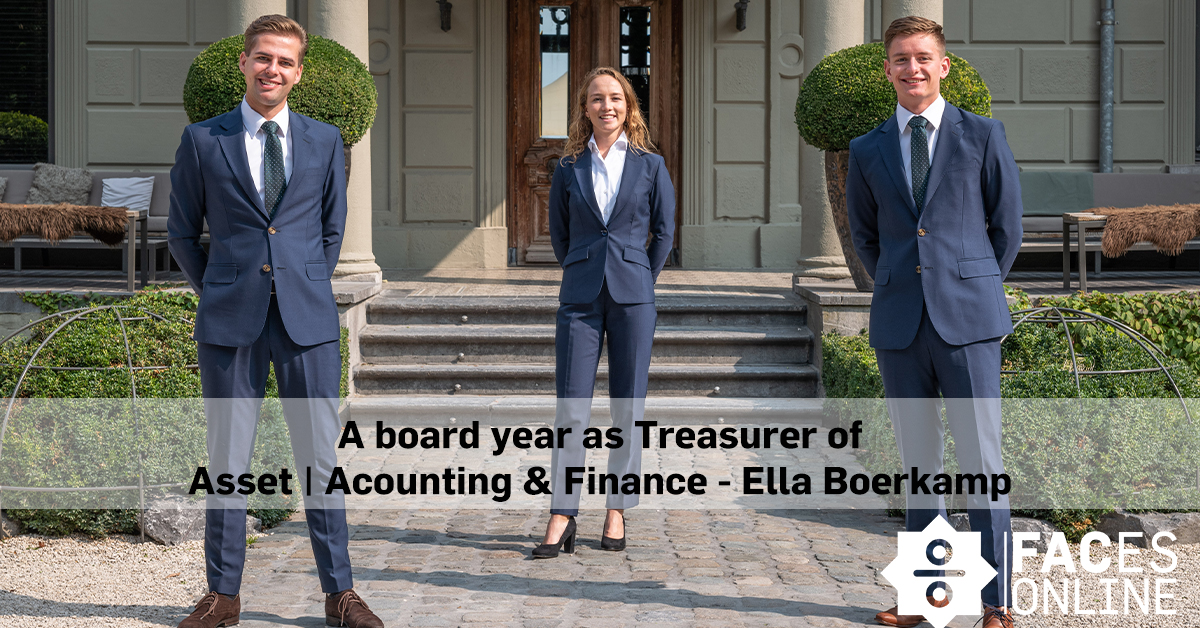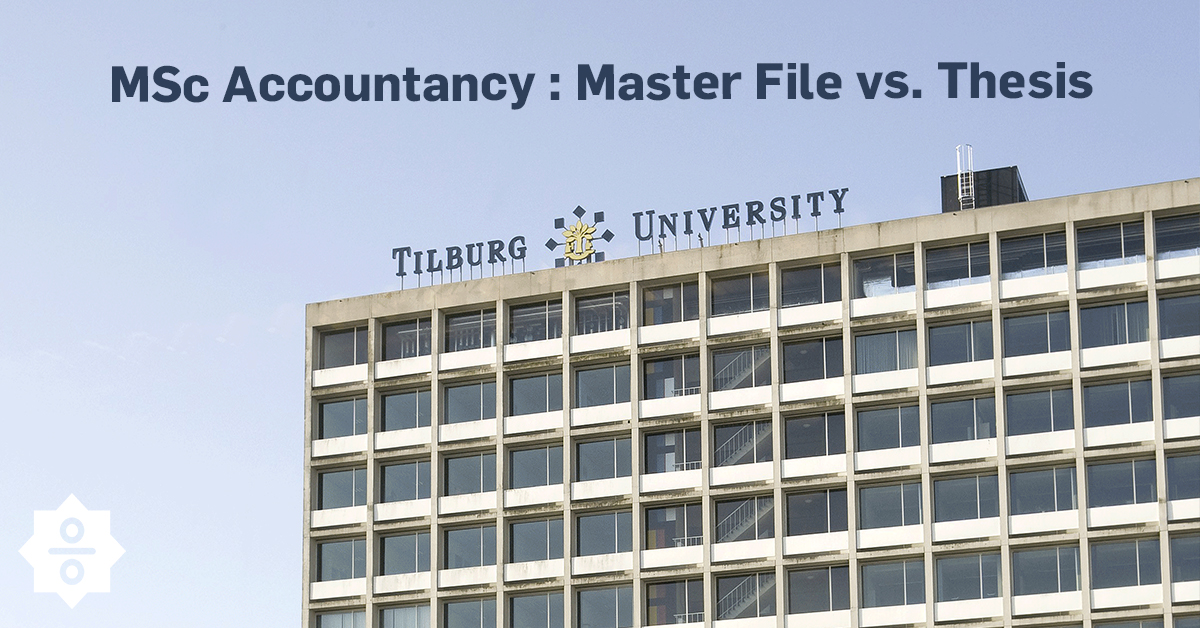Wijs specializes in auditing the financial data of various educational organizations and in providing advice. Their structure is characterized by an informal atmosphere and by paying attention to the employee. Faces visited the office and spoke with Remco Stolzenbach about how he experiences his work at Wijs. Who are you and how did you end up at Wijs? I’m Remco Stolzenbach, 24 years old and I’m completing my bachelor’s degree in business economics at Tilburg University. I also work out at the gym and am writing my thesis on CSR-based compensation. I ended up at Wijs via Asset. I had some delay during my studies and was looking for a job to gain relevant work experience. I chose accountancy because I find it interesting to learn what happens behind the scenes at companies. I came across Wijs on the Tilburg Career platform. After consulting the website and sending a message, I received a call back within 5 minutes. Why specifically Wijs? I have always found education interesting and therefore have a connection with the Wijs client portfolio. In addition, I was curious about what the work at a specialized firm entails. I like the interface with society and think it is nice that I can contribute to that. I was looking for an office where I could work for a whole year and Wijs was very thoughtful in giving me that opportunity. What struck me immediately during the interview was that Wijs pays attention to its employees. For example, despite Covid, there was a free spot for me in the office. This helped me find my way around and get to know my colleagues. “At Wijs, we believe that a good work-life balance is important.” What does your day look like? Every day is different, depending on what the schedule looks like. Each week I am scheduled for 1 or 2 customers in teams of 2-5 people. Wijs focuses on audits within the education sector. The clients I work with are primary education, secondary education, childcare institutions and collaborative organizations. Activities vary from annual audits, budget audits – in which we check funds that school boards receive from the government – to benchmarking and tasks in the area of legislation and regulations. I have a broad range of tasks and deal with several items in the annual accounts. At Wijs, we believe that a good work-life balance is important. That’s why I don’t have to work overtime and can just pack up my things at 5 o’clock. I really like the fact that when I’m home, I don’t have to think about work and can focus completely on my thesis. How would you describe the atmosphere at Wijs? Easy-going, you can always join someone for a chat. We are a relatively small office without a hierarchical structure. As a result, the atmosphere is informal, light-hearted and we are well-informed about how each other is doing. During lunch, we tell each other what keeps us busy outside work. Wijs also organizes various activities. There’s a skiing holiday, a staff outing and a Christmas dinner. During the staff outing, we went off-road and took a skidding course. Drinks are also organized at the office. Every season ends with a party. How does Wijs give you the opportunity to grow? When I came here, I was immediately assigned a supervisor to whom I could ask my questions. When I started, she and my colleagues made sure that I was quickly up to date and could get to work. Internal courses are organized for new activities, so that everyone knows what we are doing. If I have a problem, I can always bring it up with the project leader. How do you experience the combination work/study? I like the combination of work and study. During the first six months that I worked at Wijs, I also took some courses and worked three days. Now, I only have to focus on my thesis and I also work 4 days. Just like me, Wijs also thinks it’s important that I succeed in my studies, so if I need more time for school, this is always possible after consultation. What advice would you give to students? The choice of a workplace is personal. Some people find it important to work at a large office for large clients, while others find the atmosphere on the work floor and a good work-life balance important. I think it is important to do something of social importance, which is one of the reasons why I chose Wijs.
Working at EY
For the Dutch version, click here Vitality is a theme that is often put high on the agenda within large organizations, but where people do not always have a clear picture of the concept. EY is one such firm where, alongside Tech, Diversity & Inclusiveness and Corporate Responsibility, Vitality is referred to as one of the four main focus points and where personal career development is central. We talked to Marieke Brouwers to find out how this theme manifests itself in practice. Marieke Brouwers is Manager Audit at EY, but in November she also won the World Championship Duathlon! After 10 kilometers of running, 40 kilometers of cycling, and another 5 kilometers of running, she was not only the fastest of her age group but also the fastest overall. She traveled to Aviles (Spain) with the motto ‘participating in a World Championship is more important than winning’ and eventually took home the title of “World Champion”. Something that had not even occurred to her beforehand. Could you briefly share a bit about your career path and your current position within EY? In 2014 I completed my Master’s in Accountancy at Tilburg University and then started at EY Eindhoven in September. In the meantime, I have also obtained my Post-Master (RA) and I am a manager in the audit practice. During my first years, I served many different clients and gained experience in different sectors. In 2018 I worked in Tokyo for EY for six months, which was a hugely cool experience! Currently, I am working in the Amsterdam office where the biggest client in my client portfolio is one of the clients I served in Tokyo. How do you manage to combine this busy job with everything else you do besides work? One of the sayings I often make is “time, is priority”. I really enjoy exercising and find that it makes me a better person. If I didn’t prioritize sports, I’m sure it wouldn’t benefit my performance at work. Especially in busy moments, I find it very important and nice to clear my head by exercising. Despite having a busy job, in my opinion, there is no such thing as a large number of hours in the week that you can arrange yourself. There are colleagues who find it relaxing to then sleep in, “Netflix” or have a family that they invest a lot of time in but draw energy from. I live with my boyfriend, have a rich social life, and a busy job but I can arrange my own time in such a way that I do exactly the things that I need and get energy from. Sports is one of them. What does a day in your life look like? Actually, there is not really a standard day in my life. I train about 15 hours a week according to a schedule that I get from my coach. Each day is then indicated what I should do, which can vary from running to cycling to swimming or strength but also a combination of the aforementioned sports is quite possible. I always get this schedule on Thursday or Friday for the next week. However, I can indicate in advance if training on a particular day is not feasible because, for example, there are deadlines for work or client appointments outside the door. Also for work, I know what needs to be done each week. Based on this, I plan my week on Friday with a combination of work and sports. Of course, this is not set in stone but it gives me peace of mind that I basically don’t have to think about it anymore. “Within an organization like EY everything is possible, as long as you communicate clearly about it and indicate what you need.” Today, for example, I was at the gym at 7, was showered, and sat behind the laptop at 8:30. I will go for an hour run as soon as it gets dark and have to answer some emails after dinner. Tomorrow I go to the office and there is a 2-hour bike ride scheduled as training. So then I’ll try to get to the office nice and early so I’m not home too late to eat, let that sink in, and then get on the Tacx (indoor bike) to do my workout. What does the theme of ‘vitality in the workplace’ mean to you? In my opinion, vitality in the workplace is the right balance between work and other things that are important to you. Personally, I get a lot of energy from my work, but if I only worked that would no longer be the case. The balance you need between work and home is, in my opinion, important to be a happy person. Only when you are happy and pleased with yourself can you get the best out of yourself and others. So when my colleagues have found this right balance they can get the best out of themselves and other teammates and deliver the energy at work that they deserve. In my eyes you are then “vital” or “fit for the job”. For me personally, that is clearly sport and my social life, but there is no right or wrong here. Vitality in my eyes is therefore not directly related to sport. Why do you think this theme is so important? This theme is especially important in order to realize that more is not always better. Many people have the impression that the Big-4 firms are all about working long hours, but that is not the case at all. I also try to communicate clearly to my teams that balance is very important. For example, I would rather have a staff or senior indicate that he needs to do something for himself and is productive for 8 hours and recharges himself than work 10 hours but is only productive for 6. When someone is comfortable in their own skin they can function better which improves quality. It
A board year as Treasurer of Asset | Accounting & Finance – Ella Boerkamp
For the Dutch version, click here As Treasurer, you are responsible for the finances of Asset | Accounting & Finance. In addition, you coordinate the Activities, CityTrip, and Investment Night Committee. In this article, I describe my experiences as Treasurer of Asset | Accounting & Finance. Why did I choose to do a board year at Asset | Accounting & Finance? During the first three years of my student life, I wanted to get my credits as quickly as possible. After three years, I obtained my bachelor’s degree and started with the Master Accountancy. I realized that after one year I would probably be finished with studying and therefore also with my student life. This made me doubt. After all, I was only 21 years old. Then I started thinking and came to the conclusion that I wanted to do something else. Therefore, I started to find out how I could prolong my student life a bit and meanwhile gain experience within my interests. As of my third year of study, I have been an active member of Asset | Accounting & Finance and I always had a good time. For me, that was the main reason that I applied for a board year. I wanted a fun and above all enjoyable year. A board year at A&F was therefore the perfect choice. After all, I already knew most of the members, completed the Master Accountancy and I could come into contact with a variety of companies. “What do you do all day?” That is a question I often receive from many friends. Actually, it is difficult to explain what you do all day to people who have not done a board year. When I started my board year, I knew it would be a busy year with many responsibilities, but what it would look exactly was also not clear to me. On Monday morning, we always have our board meeting. When I saw the agenda for the first time, I was flabbergasted. The agenda contained a lot of different topics, such as our formal and informal events, articles that need to be written for Faces-Online, acquisition, etc. As a board member, you are doing a lot of different things, because everything needs to be well-organized and nothing should be forgotten. In short, besides having drinks with fellow students, you have a lot of responsibilities as a board member. At the moment of writing this article, I am thinking again: “What did I actually do last week? The week always flies by!” Is the position of Treasurer exactly what I expected? Before I started my board year as Treasurer, I expected to be busy with the bookkeeping of A&F: paying invoices and declarations, requesting quotes, keeping track of the budget, and sending out invoices. In the first few weeks, I was indeed very busy with this. Twinfield, our accounting software, was not really my best friend at the time and it took me a while to understand and work efficiently with the system. Every week, I mean every day, I contacted my predecessor with questions about Twinfield. After a while, I became more and more proficient and I started to understand what my predecessor meant by ‘Twinfield is just like gaming’. “That as a board member of A&F, you are working in a mini-company with 120 employees and you will never get these responsibilities at your first job.” In contrast to the beginning of my board year, I am currently spending much more time coordinating my three committees. This results in variety in my work. The Activities Committee organizes various events for active members so that they can get to know fellow students despite the few physical contacts that are currently possible. I also coordinate the Investment Night Committee. Investment Night is a symposium that will take place on May 12. Organizing this is a very fun and exciting challenge. Furthermore, I am the coordinator of the CityTrip Committee. I am very happy with this, because last year, I was a member of the StudyTour Committee that organized the trip to South Korea. Even though traveling is not possible at the moment, we still organize fun activities! Besides coordinating my committees, I am also busy with helping other board members, the weekly meetings of all Treasurers of Asset, the quarterly Audit of Accounts, the bookkeeping of the Alumni Association Financials, and the Financial Association Netherlands (FAN). What are you most proud of? I am proud of the fact that, with all the board members, active members, and partners, we have made it an inspiring and instructive year so far. As a board member in this crazy period, we have to make sure that we keep all our partners and members happy. We ensure that events continue and that requires us to be proactive and creative in finding solutions. Hence, our problem-solving skills were highly demanded this year. I am also happy about and proud of the fact that all our events have taken place this year, despite the various Covid-19 restrictions. As a result, fellow students still had the opportunity to develop themselves and get to know other students. Would I recommend a board year to others, even in these strange times? Definitely! When I started my board year in the summer of 2020, I knew that my board year would be different from a ‘normal’ board year. Nevertheless, it has been a fantastic period so far! My board year cannot be compared to any other board year. I hope, of course, that this unique board year will not become normal. During this year, we had to do the best we could to remain successful as a study association. Every event needs to have a plan b and c, which are usually a physical plan and one or two online plans because the rules are constantly changing. For this reason, we are constantly searching for the best option. Looking back at what I have learned, I dare to say
Growing stress among students due to COVID-19
For the Dutch version, click here Since the beginning of last year, life has been at a standstill. Where normal life first started up again at a snail’s pace, within no time everything ground to a halt again. Everyone has experienced lesser moments. For example, for some, social life has largely fallen away and the pressure at school is difficult to keep up with from home. In this article, we further explore how students from Tilburg University experience stress due to current conditions. Also, this article reflects the experiences of fellow students who are members of Asset | Accounting & Finance. Last year Worries about now and the future, everyone knows them. For some, it is easier to deal with them than for others. Everyone has different worries, which weigh in differently for each person. One person braves crisis after crisis and another needs a hand to get back on his feet. The situation started and everyone deals with it in their own way. A press article from Tilburg University reveals an increase in psychological complaints, particularly among students. A group that is normally socially very active, who have experienced many changes due to the measures. A group of people who often have a different outlook on life than, for example, full-time workers. For many people, attending lectures helped with discipline, a fixed routine with work, school, and private life. A routine that now takes place mainly in student rooms, because the lecture banks and libraries are no longer accessible. Furthermore, there are people who have lost a nice side job, because practicing their job is not possible within the current measures. The imbalance is a major cause of stress for many. Fortunately, there are several ways to make it a little easier on yourself. Experiences of A&F members How are members of Asset | Accounting & Finance (A&F) experiencing this strange period? In response to this issue, a number of A&F members were interviewed who are currently pursuing the Bachelor of Business Administration, Master of Finance, or Accountancy. Bo Janssen, MSc Accountancy, gives her experience about switching from physical to online classes. “The online lectures were fine although it was harder to really interact with other students. The second semester I found it a little more difficult. The only interaction left was through online Q&A sessions and usually not a lot of questions came up there.” Sem van den Berg, MSc Accountancy, briefly talks about the effects the current period had on his motivation. “I did notice that my motivation for attending lectures deteriorated. In the end, my school performance did not suffer. I am normally used to completing subjects without much interaction and personal guidance.” Thus, it can be concluded that studying in the ‘new normal’ has its advantages and disadvantages. For example, one person generally experiences online classes as pleasant, but the lack of interaction proves to be an obstacle for another. An obstacle that some people cope with better than others. The role of Tilburg University What role did the university have in the transition to the new normal for students? Has the university handled this positively or negatively? In the end, every organization has had to make drastic decisions due to the current measures. The school shows an upward trend in terms of application measures that apply in education according to Bo Janssen. “Furthermore, I think that they are now trying to look at how a certain subject can best be arranged online instead of just transferring the lectures that are normally given physically to online (for example, by making videos available at any time).” “For many people, attending lectures helped with discipline, a fixed routine with work, school, and private life. A routine that now takes place mainly in student rooms” Similarly, there were also students who took a critical view such as Ahlam Kodade, MSc Finance. “I understand that these are special times for all of us. That we have to be creative and flexible with solutions, but I got the feeling that little consideration was given to international students like me. An important group for the education sector.” Some students felt that things were unclear like Jari Heijnen, MSc Accountancy. “There was a lot of ambiguity from the university, in that respect, they can still learn a lot. Also, there is an expectation that students are always available for an online lecture and that is not possible for many working students.” Lack of clarity is a recurring thought in Tilburg University’s course of action. The university is actively working on it and adapting its new teaching methods as time goes on. Lessons will certainly be learned from this new form of teaching and the policies of the educational institutions and national government for years to come. Tips from A&F members How have members of Asset | Accounting & Finance kept themselves mentally and physically fit this year? A few members will briefly explain the positive habits they have adopted. Perhaps this will provide inspiration for maintaining a healthy attitude. Discipline and daily routines can be supportive in times of studying at home, says Joep Groenen, Bsc Business Economics. “First of all, I think it is important to keep a good daily routine: get up on time, shower right away, etc. That way I fill in my day much more effectively and I have more motivation. I also like to go outside regularly because I am indoors a lot.” Thus, sporting activities can also contribute to your health according to Sem van den Berg. “I mainly focused on going to the gym. In addition, I used to run in the summer. I notice that sports can have a positive influence on your mental state.” Others have been able to get a lot of peace of mind from being home with family as described by Ahlam Kodade. “I spent six months in my home country. I think this was very valuable since I had no courses at the time. It was nice to
The CFA track: a valuable addition to the Master Finance?
For the Dutch version, click here It is a well-considered choice for many (future) students of the Master Finance: the CFA track, a specific study program that is a stepping stone towards the Chartered Financial Analyst (CFA) level 1 exam. In this article, two students provide their insights and share personal experiences. Furthermore, Peter de Goeij, Academic Director of the Master Finance, gives an insight into the university’s rationale behind this program. Chartered Financial Analyst is a globally acknowledged certificate, provided by the CFA Institute. The CFA Institute is a worldwide renowned institute that provides investment professionals with finance education. It aims to promote standards in ethics, education, and professional excellence in the global investment industry. It offers several international designations, amongst the famous Chartered Financial Analyst (CFA) designation. Tilburg University is linked with the CFA Institute enabling access to students – worldwide – to study at our institution. Having a CFA certificate displays your knowledge in analyzing, understanding, and applying investment instruments. Boris de Bie (24) chose this particular track as it provided more in-depth information regarding financial management and investment analysis: “During my Bachelor’s degree I regarded investments and financial instruments as the most interesting topics. When I found out that there was a specific track in the Master Finance that particularly focuses on these topics, it was an easy choice.” To ensure that you obtain an appropriate preparation for the CFA-exam, the track contains certain restrictions relative to the regular MSc Finance track: “If you decide to choose the CFA-track, there are several courses that you will certainly follow, such as Investment Analysis, Empirical Methods in Finance, Advanced Corporate Finance, and Financial Statement Analysis & Valuation. Besides these courses, there are three electives, for a total of 18 ECTS that you can pick. The number of possible electives is smaller compared to the regular track. However, if your main interest lies in the field of investing and financial instruments, these are the courses that you would have chosen anyhow.” Sjors Seinen (22) had a similar decision-making process regarding the choice for the Master Finance – CFA Track: “I was already familiar with the CFA charter given that Tilburg University offers a Finance Master that primarily focuses on the topics deemed important by the CFA Institute. Knowing that my interest lies, to a large extent, with investing and asset management, the Master Finance – CFA track seemed to be cut out for me. Hence, I opted for the CFA track program to prepare myself well for a future career in investment management. “The top employers of CFA charter holders globally include JP Morgan, UBS, Morgan Stanley, BlackRock, and Goldman Sachs.” After finishing his Master Finance, Sjors directly started with the preparations for the CFA-exam: “After successfully defending my Master thesis this September, my time as a student at Tilburg University had come to an end. Nevertheless, being only 22 years, I decided not to immediately enter the labor market. Instead, I found that I could supplement the acquired knowledge I gained during the Masters by enrolling for the CFA Level I exam.” Whilst studying for the CFA-exam, Sjors discovered that there was more to it besides the gained knowledge during the Master Finance: “Even though the Master Finance – CFA track covered all finance-related topics embedded in the CFA curriculum, the focus of the CFA exam level I goes far beyond portfolio management, equity investment and fixed income alone: approximately half of the study material is dedicated to fields such as ethics, economics, quantitative methods, and financial analysis and reporting. Therewith, the CFA Institute ensures that its members and candidates have an all-out understanding of any disciplines that could be associated with the investment management profession.” Even though the CFA exam contains additional study material that goes beyond the Master Finance program, Sjors did experience the CFA track to be substantially helpful: “Mandatory Master courses like Fixed Income Analysis, Derivatives Securities and Risk Management, Financial Analysis and Investor Behaviour provided an accurate reflection of the Finance-related topics in the CFA curriculum, which saved me tons of study time that I could now redirect to other prominent topics (e.g. ethics).” Approximately two weeks ago, Sjors finally took the CFA level I exam: “After three months of preparations, I took the CFA level I exam on December 5, 2020 in Amsterdam. Although the results will not be published for the next two months, I am very certain to have passed the exam, mainly thanks to the Master Finance – CFA track!” According to Peter de Goeij, Academic Director of the Master Finance, the CFA track offers multiple benefits to students interested in this knowledge area: “The CFA track covers about 75-80 percent of the material for the CFA level I exam. In that way, there are huge time-savings possible when studying for this exam. In addition, for a few students scholarships are available that help cover some of the fees for the level I exam.” After passing the exam, a CFA-student has various options to enter the labor market, according to Peter de Goeij: “The top employers of CFA charter holders globally include JP Morgan, UBS, Morgan Stanley, BlackRock, and Goldman Sachs. In general, the main profession is found in wealth management institutions, financial advisor companies, and (investment) banking companies.” All in all, the CFA track incorporates many courses and topics that are well-suited for students with a particular interest in asset management and investment analysis. It offers a curriculum that covers around 75 percent of the CFA Program Candidate Body of Knowledge (CBOK) and is, therefore, a good preparation for the CFA level I exam. Interested in this particular master track? Check your eligibility and the deadlines for the applications here. For international students: check your eligibility here.
MSc Accountancy: Master File vs. Thesis – what’s the difference?
For the Dutch version, click here Over the years there have been many debates about whether a thesis at the end of a graduate’s education actually helps him/her in becoming a better employee in practice. Many have argued that a thesis can improve the skill set of the student and enhance his/her capabilities, while others have argued that it adds no extra value to what they will eventually end up doing. This has been the case in the accounting sector. Tilburg University has responded to this by taking a different path than other universities when it comes to writing a thesis. They have looked to improve the link between students and their future job. This has led the MSc Accountancy at Tilburg University to introduce the MSc File Accountancy, better known as the Master File, to replace the thesis of the graduate accounting students since the academic year of 2019-2020. Master File You might ask yourself, what is the Master File; and what makes it so special? The Master File is a more practice-oriented thesis but with a clear academic basis, and consists of three parts, namely a Business Application, a Replication Study and a Research Note. The Business Application focuses on a real-life problem experienced by a selected company. This company is then given advice through the use of published academic research of which the findings are applied to your individual case. Hence, this covers more of the ‘literature research’ that you would have ought to do in a ‘regular’ accountancy thesis. In the Replication Study students have to select an already published research paper which they will have to replicate with a well-motivated variation in the context and/or time of the study. This part of the Master File is meant to cover and train your data analytics skills which are tested in the latter part of a regular thesis. The Research Note, the third report, approximates a traditional thesis as most of us know. However, it has a shorter length than the traditional thesis as it is meant to be briefer. The goal of the Research Note is for the student to come up with a creative idea for a new research and to develop a plan on how this would be executed. Hence, the entire research should not be conducted, but the plan should be substantiated with literature research and the student should assess the appropriate data analytics that ought to be used. These three components form together the Master File. The first two components each weigh 25% of the final grade and the third component weighs 50% of the final grade. Furthermore, it is important to mention that each component links to a different field within accounting. For example, you can conduct your Business Application in the setting of Management Accounting; your Replication Study in the setting of Financial Accounting; and your Research Note in the setting of Auditing. Main Differences Nevertheless, after conducting all three components, it is hard to try to find a clear difference between a regular thesis and the Master File. The main differences lie in the context that it is given in and in the skills that they focus on. The Business Application brings you in direct contact with the practical world as students will have to solve a real-life problem solely based on academic literature. This makes it clear that the Business Application pushes students to get in direct contact with the practical world, which is not the case for the regular thesis. The Replication Study focuses more on the replication of a study as to where a regular accountancy thesis would at least need an add-on and a clear contribution to the academic field and/or the practical field. As for the Research Note, since you are not conducting an entire thesis, with that meaning that the execution of empirical tests are limited, (though they must be planned out), the main difference lies in the execution of the project. Pros and Cons After having interviewed several students¹ that have completed the new Master File and other students that have completed the ‘old thesis’, they have named several pros and cons to the new Master File towards the ‘old’ thesis. One pro that has often been accredited by the interviewees was the set-up of the Master File. Most students can agree that conducting the Business Application and the Replication Study before the Research Note has helped them a lot. The reason for this is because they were able to apply the skills that they have learned in the first two components of the Master File on to the third component. Next, students were keen to mention that they appreciated the more practice-oriented setting that the Master File has brought. “Furthermore, almost every student interviewed also mentioned that a big pro was having to learn three different accounting subjects against just one.” Furthermore, almost every student interviewed also mentioned that a big pro was having to learn three different accounting subjects against just one. This contributes to a broader knowledge within the field of Accountancy and has also contributed to increasing their expertise in all three areas as opposed to just one. Also, one student conducting the ‘old thesis’ mentioned that she was particularly jealous of the students following the new Master File. “The skills that they have gained while conducting the Replication Study was much more profound than mine. I felt like they really had less obstacles when conducting the Research Note compared to me when I was conducting my ‘old’ thesis”. Lastly, some students really liked the idea of spreading the workload over the entire year. However, this also contributes to a con of the Master File since not all students really appreciated this. “Having your workload spread-out throughout the entire year may have its benefits, but it can sometimes get really busy when you have to follow your regular courses next to it.” Moreover, students have mentioned that they would have appreciated more guidance during their second assignment, which was







